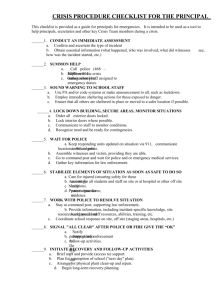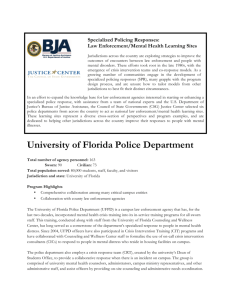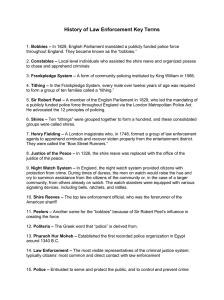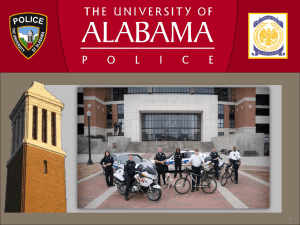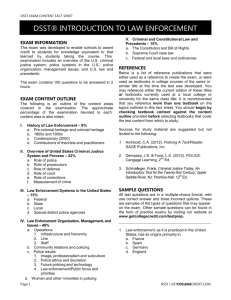LECJ-450, Law Enforcement Management and Planning, 200
advertisement
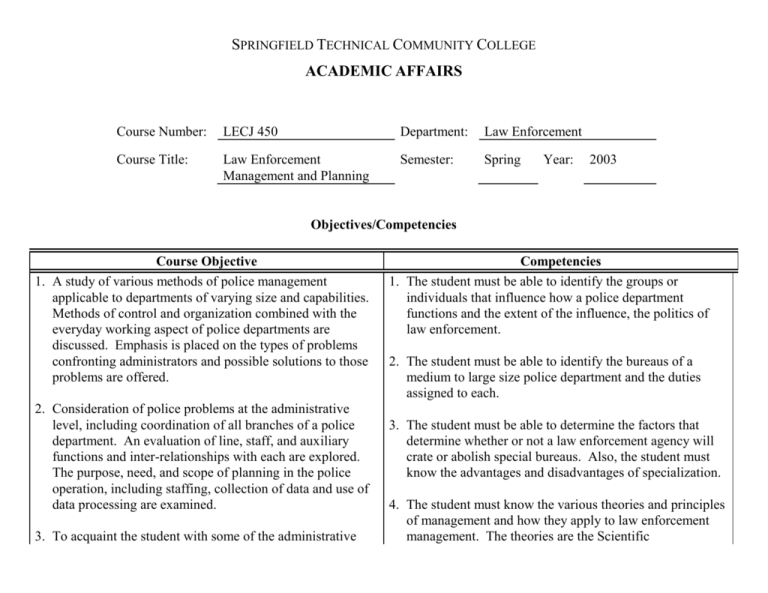
SPRINGFIELD TECHNICAL COMMUNITY COLLEGE ACADEMIC AFFAIRS Course Number: LECJ 450 Department: Law Enforcement Course Title: Law Enforcement Management and Planning Semester: Spring Year: 2003 Objectives/Competencies Course Objective 1. A study of various methods of police management applicable to departments of varying size and capabilities. Methods of control and organization combined with the everyday working aspect of police departments are discussed. Emphasis is placed on the types of problems confronting administrators and possible solutions to those problems are offered. 2. Consideration of police problems at the administrative level, including coordination of all branches of a police department. An evaluation of line, staff, and auxiliary functions and inter-relationships with each are explored. The purpose, need, and scope of planning in the police operation, including staffing, collection of data and use of data processing are examined. 3. To acquaint the student with some of the administrative Competencies 1. The student must be able to identify the groups or individuals that influence how a police department functions and the extent of the influence, the politics of law enforcement. 2. The student must be able to identify the bureaus of a medium to large size police department and the duties assigned to each. 3. The student must be able to determine the factors that determine whether or not a law enforcement agency will crate or abolish special bureaus. Also, the student must know the advantages and disadvantages of specialization. 4. The student must know the various theories and principles of management and how they apply to law enforcement management. The theories are the Scientific Course Number: LECJ 450 Page 2 Course Objective Competencies problems existent in most police departments, and to Management, the Administrative, the Bureaucratic, present to them the basic police organizational structures in Human Relations, and Open Systems theories. which the administrator must perform. Levels of command, and basic operational functions will be reviewed 5. The tests, procedures and legal issues used in the selection to allow for some understanding of the multiplicity of process of law enforcement personnel. interaction between members of a police organization at the routine, administrative and political levels. 6. The student must become familiar with the problems of stress in law enforcement. These include the categories of stress, job induced problems, drug and alcohol use, suicides, and post-shooting trauma. 7. The student must learn the collective bargaining process. This includes the grievance process, and the penalties of found in violation of departmental rules and regulations. 8. The student must know the function of the Internal Investigation Process. This includes the staffing, the purpose of the unit, and the process and reasons complaints are filed against law enforcement personnel. 9. The student must become familiar with legal aspects of police administration such as civil and criminal liability affirmative action, use of force perjury and corruption. This includes exposure to ethical values and judgements.

